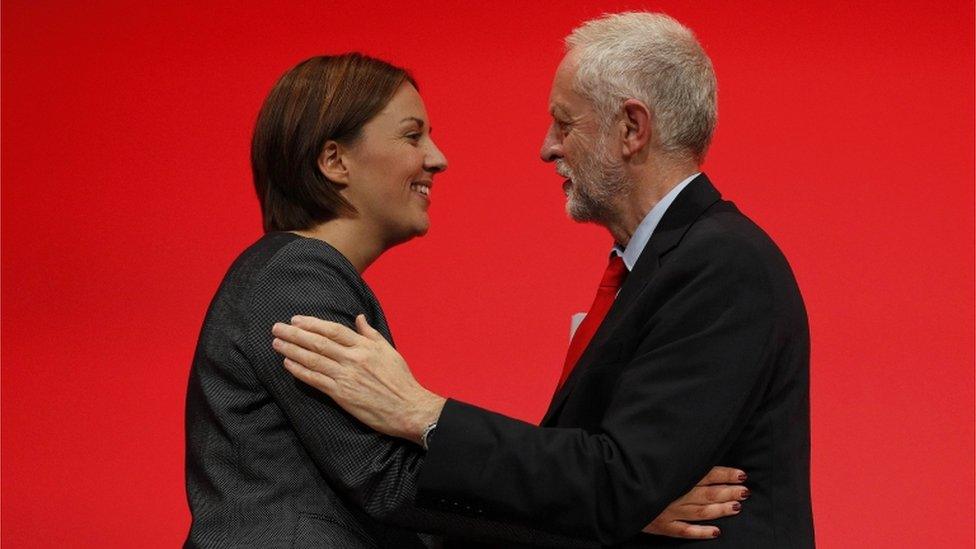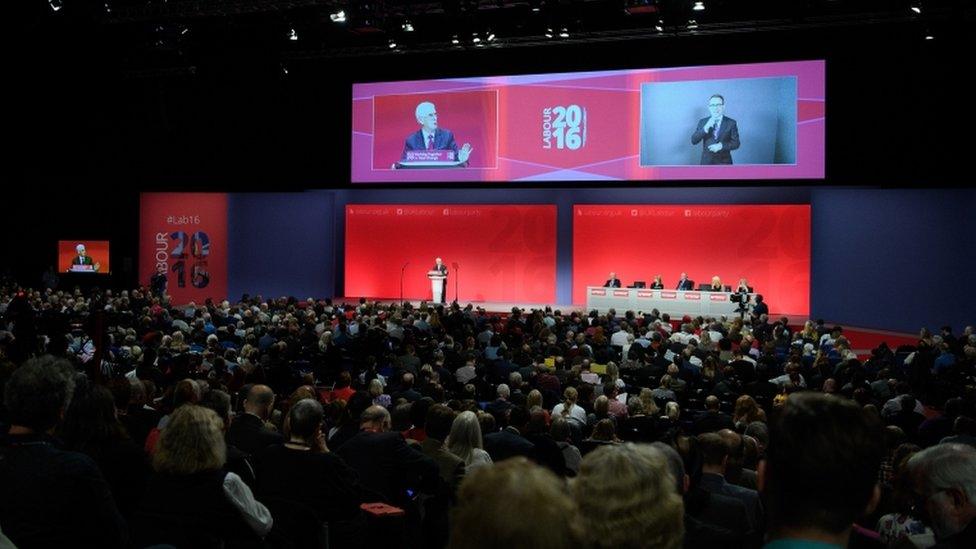Reforms to give Scottish Labour more autonomy are approved
- Published
Jeremy Corbyn says his party 'can win support in Scotland'
Scottish Labour is to get more power and autonomy after reforms were approved by the party's UK conference.
The Scottish party will be able to set policy in all areas, including reserved matters, and appoint a member to the UK-wide National Executive Committee.
Leader Kezia Dugdale has said she will take up the NEC position herself.
There had been calls for the seat to be elected, with the Unite union saying the new system "doesn't sit well with our values of democracy".
But UK leader Jeremy Corbyn had told BBC Scotland he was happy for the full package to be approved.
A fresh attempt to delay the plans was defeated at the Labour conference in Liverpool on Tuesday morning.
Allies of Mr Corbyn feared allowing Scottish Labour leader Kezia Dugdale and her Welsh counterpart to appoint a representative to the NEC would water down Mr Corbyn's influence over the party's ruling body.
A vote was later held on the changes, which Ms Dugdale said would make Scottish Labour "fully autonomous".
Ms Dugdale immediately announced she would take a place on the NEC, with the first meeting due to take place on Tuesday evening.

Ms Dugdale said: "Given the vital importance of this role, I will join the NEC. I will be a loud and passionate voice for Scotland's interests within our UK wide Labour family. This is a key moment in the history of our party, and our movement."
The Scottish Labour leader told BBC Scotland the rule changes "matter".
"I understand that to a lot of people this might seem like naval gazing, that it's just the internal matters of the Labour party," she said.
"But it does matter, because it's now very clear and beyond all doubt, the Labour party speaks up for Scotland and puts Scotland first.
"That means we can go back out into our communities, talk about our values and our principles and our vision for the country and do it with the interest of people in Scotland at the fore. And I think that's what voters across Scotland expect from the Labour party."
However, Pat Rafferty of the Unite union - whose members abstained in the final vote - said he was "disappointed" that delegates were not able to vote on the NEC seat issue separately from the other reforms.
He said: "We are fully supportive of autonomy for the Scottish Labour Party and have campaigned for it. But having Scottish Labour's new seat on the NEC appointed by one person doesn't sit well with our values of democracy, accountability and bringing power closer to people.
"We look forward to discussing Scotland's representation on the NEC further. And those discussions will consistently look to strengthen democracy and accountability in the party."
The reforms mean that:
The Scottish Labour Party Executive Committee (SEC) will be responsible for the procedures and selection of all UK parliamentary candidates in Scotland
The SEC will have overall responsibility for the management of constituency Labour parties in Scotland
The Scottish Labour Party will be directly represented with voting rights on the NEC
Scottish Labour will have full control over policy making, including in reserved policy areas
But Scottish Labour is not becoming a separate party and is expected to continue to share finances with the UK party

The reforms were voted on by the conference in Liverpool
It followed Mr Corbyn telling BBC Scotland on Monday that he would be "very happy" for Ms Dugdale to be able to appoint a representative to the NEC.
He added: "I work very well with Kezia. We have campaigned together. We have had a good conversation this week and we'll continue to do that.
"What I have said is there has to be a Scottish member of the National Executive and for that matter a Welsh member.
"The method of decision-making on that is what the discussion was about. We will come to that conclusion, and there will be a Scottish member of the National Executive."
Ms Dugdale had been a high-profile backer of Owen Smith's leadership bid ahead of Mr Corbyn being re-elected as Labour leader on Saturday.
When asked whether he believed Labour could win an election in Scotland, Mr Corbyn responded: "We can win a lot of support in Scotland", before saying that the Scottish party was "in good heart" after an increase in its membership and three council by-election wins.